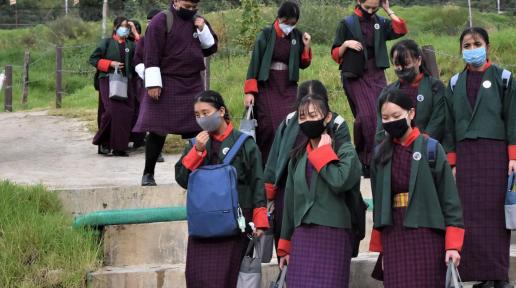Story
23 September 2025
Meals of Change
In the highlands of eastern Bhutan, where nomadic Brokpa traditions run deep and access to basic services can be challenging, schools have become more than just places of learning. For many children, they are a second home, a source of nutrition, and a haven. In communities where families depend on herding yaks and sheep for survival, food security is never guaranteed. For many students, school lunch is their most reliable source of nutrition. That is where Bhutan’s National School Feeding Programme comes in, delivering daily meals that help children not only survive, but thrive. At Sakteng Lower Secondary School in Trashigang, this transformation is especially evident. Through the National School Feeding Programme, education is now deeply intertwined with health and well-being. “School feeding is vital in a place like Sakteng,” says Principal Sonam Jigme. “Children here receive the right kind of food, in the right amount, and food that helps them grow, focus, and thrive.” For families in this community, where herding yaks and sheep is the primary livelihood, food security can be fragile. Many children come from homes where meals are uncertain, especially during long transhumance journeys. For them, a warm school meal is the most reliable source of nutrition, and a compelling reason to stay in school. The impact of school feeding goes beyond nutrition. The programme is a powerful incentive for school attendance, especially for girls. With boarding facilities added to the school, girls who once stayed home to help with chores or were kept back due to safety concerns now have a secure environment to study and grow. “These meals are the reason many parents feel comfortable sending their children to school,” explains Principal Sonam Jigme. “It is not just food, it is trust, it is opportunity, and it is a lifeline.” For Sangay Dema, a student of Sakteng Lower Secondary School, the introduction of boarding facilities has brought a major shift, particularly for children from nomadic families who once stayed alone while their parents moved with the herds. “Before the hostel was built, I had to stay alone when my parents went with the herd,” said Sangay Dema. “Now, I stay in the hostel with my friends. We feel safe, we eat well, and we can focus on our studies.” The Principal of Sakteng Lower Secondary School, Sonam Jigme said School Feeding is important for a place like Sakteng where children are fed the right food with nutritious amounts and the right quantity. Meals are now fortified with essential vitamins and minerals, and menus are carefully reviewed and approved by the Ministry of Education and Skills Development (MoESD) with input from professional nutritionists. The impact has been clear, students’ health and ability to concentrate have significantly improved. Sonam Tenzin B, the school captain, shares how much the meals have changed school life. “My favorite dish is rice with lentils and boiled eggs,” he says with a smile. “When we eat well, we can think better. I have become more active in class and even have more strength to play basketball after school.” The power of Bhutan’s National School Feeding and Nutrition Programme extends far beyond the classroom walls. In remote villages like Sakteng, it is not just the students who benefit, in fact, the entire communities are feeling the positive ripple effects. For Tashi Yangzom, a mother of two, the school meals bring much-needed relief. This sense of security has reshaped how parents view schooling. It is no longer just an educational space but a crucial source of care and stability. As a result, more families are keeping their children in school, particularly girls, who now attend more consistently due to the safer, more supportive environment. For local farmers, the programme has opened new avenues for livelihood. Through local procurement initiatives encouraged by the Ministry of Education and Skills Development, schools source ingredients like vegetables, dairy, and eggs directly from farmers in the area, which helps to strengthen the local economy and build stronger links between the school and the community. A 2023 study comparing Body Mass Index (BMI) conducted by the Ministry between day and boarding school students validated these observations. The findings became the foundation for the launch of Menu+, an initiative that ensures higher standards in food quality and variety. “We formed a School Feeding Team to oversee food preparation, maintain standards, and ensure compliance with ministry guidelines,” Principal Sonam explains. “Our kitchen staff are trained to cook safely and hygienically.” With improved nutrition, Sakteng School has seen a measurable impact. Its School Performance Management System (SPMS) score rose from 92 to 94 in just one year. The boarding model also allows for structured extracurricular activities from aerobic dance to academic clubs, building well-rounded students who are more confident and engaged. The school also modernized the school kitchen, transforming it from a traditional, smoky structure into a bright, ventilated space with proper storage and safer working conditions. In essence, the National School Feeding Programme in Sakteng has become a cornerstone for community well-being, enhancing education, improving health, supporting livelihoods, and weaving tighter bonds between school and society. For many children in Bhutan’s highlands, school is more than a classroom—it is where their futures begin, one hot meal at a time. As Principal Sonam Jigme puts it: "It is not just food. It is trust. It is an opportunity. It is a lifeline.” In Sakteng, nourishing a child means nourishing a community and shaping a healthier, more hopeful Bhutan.



